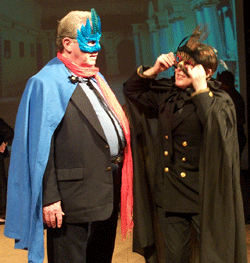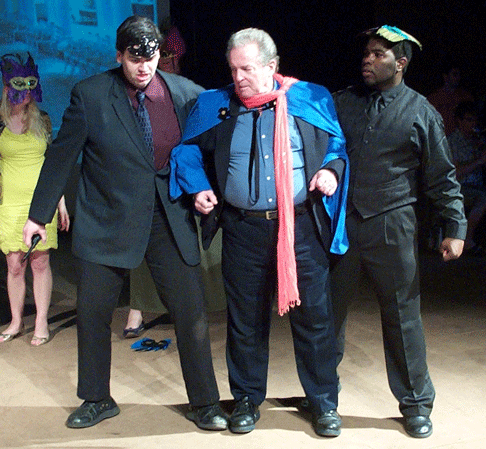Agreeable — and surprising — to find that several other shoestring
companies are flourishing, despite these bad financial times, and that venues
pop up in the unlikeliest parts of town — well, the rent is lower if the
address is stranger.
The Brooklyn Lyceum, for example, is a 1910 public bathhouse on Fourth
Avenue at President Street — they used to call it Flatbush, and now the
rebuilders say “Lower Slope,” but for many decades the plain
between the Brooklyn Academy of Music and Greenwood Cemetery was several miles
of vacant. Today it is reviving, there are tidy homes and restaurants, and you
can stroll by night and jitter-free. The Lyceum, tattered brick and the remains
of tile, contains a performing space about the size of a basketball court
— you could fit a dozen Amatos there — on a stage built over the
former pool. The look recalls the BAM Harvey (which was left to look that way
on purpose), but the stairs aren’t so steep at the Lyceum and the
bathrooms far easier to find. I strolled by one recent day for the last of
Brooklyn Repertory Opera’s four performances of Verdi’s A
Masked Ball — Brooklyn Rep always performs in English — and I
was delighted I had done so.
Full disclosure: The company prima donna, Kathleen Keske, is an old
friend whose voice I have admired in such roles as Weber’s Rezia but had
not heard in several years. I was eager to hear her Amelia, and she assured me
the rest of the cast was good. I had misgivings — I’ve been to a
lot of these little companies across the years — sometimes thrilled,
sometimes appalled. You never know. And Ballo is tricky, five big
roles and intricate orchestration. (Most such companies use a piano or two
— not Brooklyn Rep.)
 Pamela Scanlon as Oscar and Francis Liska as Riccardo
Pamela Scanlon as Oscar and Francis Liska as Riccardo
To my delighted surprise, the cast was solid, mature enough for Verdi, and
eager to sing out; the orchestra, under Stephen Francis Vasta, professional and
clear, making Verdi’s points. The chorus was on the small side, and
overly weighted towards ladies, but costs were really cut on sets (mostly
projections of the royal palace in Stockholm) and costumes, haphazard at best.
The wince-making translation was uncredited in the program — I
wouldn’t admit to it either. (But I found I could shut my eyes and think
of the Italian, and let the voices carry the show.)
I’m delaying things: To my regret, Keske was not at her best in this
role. Amelia has two personalities, the defeated subject of domestic tragedy
and the full-throttle Verdi passionista; Keske did not possess the weight or
the well-supported power for those grand arching phrases. In her quiet aria,
however — the one that, in Italian, begins “Morrô, ma prima in
grazia” — she sang with well-placed tone and great feeling for a
woman in despair, facing with resignation the loss of everything dear to
her.
The other soprano, the boy Oscar, was sung by Pamela Scanlon, whose strong,
bright soprano and clear, certain coloratura impressed me as a voice ready to
tackle Violetta and likely to give a good account of it. Her acting, as called
for by this trouser role, was on the cute side — but not a garish,
gender-mocking space alien, as in the current Met production. Riccardo —
promoted to king here but not Swedished as Gustav — was sung by Francis
Liska, with a graceful lyric line and the right air of narcissistic
indifference to the deep emotional waters in which he treads. Charles Karel
sang Renato with a sturdy, genuine Verdi baritone, warm, heartfelt and —
ultimately — grim.
 A scene from A Masked Ball
A scene from A Masked Ball
Then out came Ulrica — you know — the fortune teller — the
Marian Anderson/Ewa Podles role. Already there had been intimations of
surprise, in references in the first scene, to a “magician” named
“Ulrico.” (Why not just Ulrich?) I seized the program and,
staggered, read the name: Nicholas Tamagna. “You sprang that on me! You
didn’t warn me!” I later accused Madame Keske, who smiled.
“Would you have come if I’d told you?” “Maybe
not.” “And did you like him?” she went on smiling.
Mr. Tamagna, a countertenor who usually sings roles like Orfeo (last April
at the Brooklyn Rep, sorry I missed it) and Handel’s Cesare (in D.C. in
the fall), earned his Book of World Records (and Wikipedia) moment as the first
man ever to sing this diehard mezzo role in a full performance of Verdi’s
opera. A slim figure with a shaven head and satanic contact lenses, he sang it
all — in a room of considerable size, remember — in a seamless
top-to-bottom alto with no hootiness, no doubtful support, loud as anyone (and
everyone) else in a healthy cast, the phrases as beautiful as their eldritch
import allowed. (Verdi didn’t want his witches to sound too beautiful,
you know.) It was a totally astonishing performance, and in five minutes
conquered what reservations I had — and I’m a stickler for certain
traditions. Tamagna’s has an alto in which I wished to bask.
But the joy of the entire afternoon was being in a big room where big,
healthy voices were singing big, healthy Verdi — up close, full throttle,
no electronics, no cutting corners. Pleasure of operatic caliber. This is not
lip-service lyric but a company that knows what it’s doing.
John Yohalem
![Kathleen Keske as Amelia and Francis Liska as Riccardo [Photo courtesy Brooklyn Repertory Opera]](http://www.operatoday.com/liska-keske-ball.gif)

